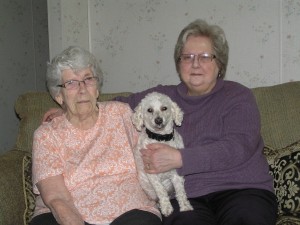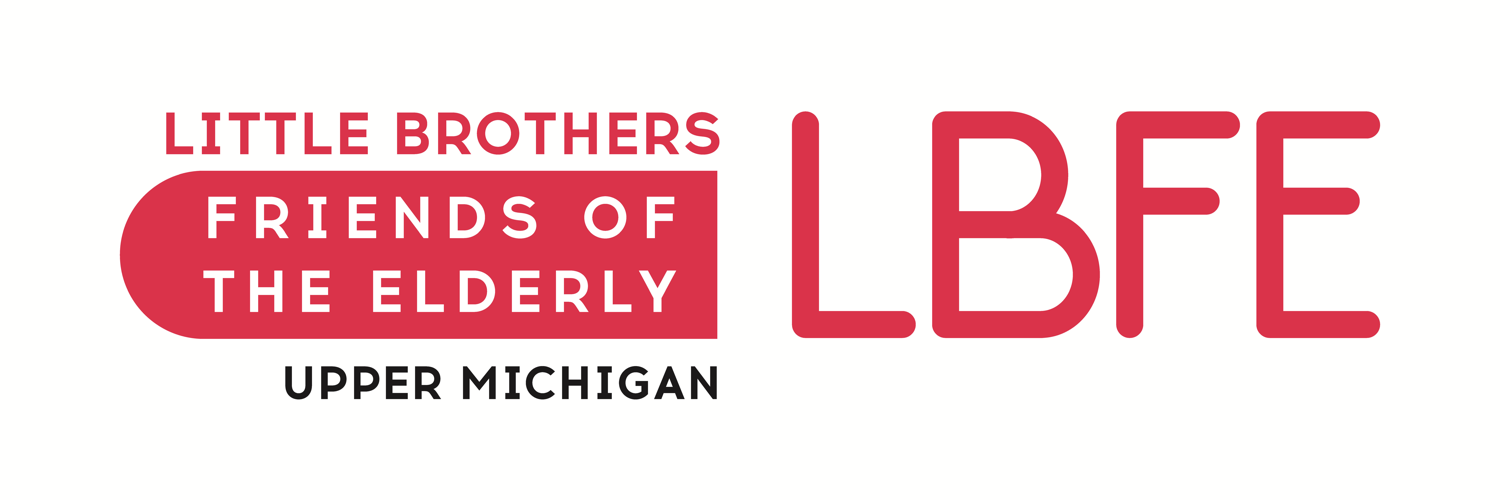May 2016: Celebrating Annie & Rachel
May 2016 Monthly Letter—Celebrating Annie & Rachel!
With her thick Scottish brogue and wry wit, Annie at age 92 has a smile just impish enough that you’re not quite sure if she’s pulling your leg.
Born in rural Scotland in 1924, Annie’s father worked the coal mines and her mother raised children. “In those days, there was no money for doctors or proper health care,” Annie explained. Sadly, malnutrition took its toll, compromising her mother’s health and causing several siblings to die in infancy. She went to school in a one-room schoolhouse. “Whatever I knew, I read out of books myself,” she said, confessing that some days she would slip out of school, cleverly evading the truant officer, and spend hours reading in the local library.
“In those days, you didn’t go on with school—you just left when you were 14. I finished class on a Friday, started work in a hospital, and have been working ever since.” She added that education is important, and if she’d had the chance, she would’ve gone on to university to become a veterinarian. As if on cue, Charlie, her little white poodle sitting next to her on the couch, leaned in for a soothing ear scratch.
 At age 17, she joined the army in Scotland and worked as a plotter as part of the WWII war effort. For this job, she was housed in an underground room with a large map of the British Isles on a table in front of her. She and other plotters were equipped with a set of headphones. Military reports about the location and number of German planes was radioed in, transmitted to them from early radar stations “and from spies,” she said, chuckling. As information came in, the plotters moved pieces on the map to indicate the number and locations of German aircraft. Directly above the plotters was a second floor where military strategists could look down at the map of evolving configurations of German planes and plan counter-offensives—thus women plotters like Annie played a vital role during the war.
At age 17, she joined the army in Scotland and worked as a plotter as part of the WWII war effort. For this job, she was housed in an underground room with a large map of the British Isles on a table in front of her. She and other plotters were equipped with a set of headphones. Military reports about the location and number of German planes was radioed in, transmitted to them from early radar stations “and from spies,” she said, chuckling. As information came in, the plotters moved pieces on the map to indicate the number and locations of German aircraft. Directly above the plotters was a second floor where military strategists could look down at the map of evolving configurations of German planes and plan counter-offensives—thus women plotters like Annie played a vital role during the war.
Plotters at the Operations Room at the Royal Air Force in England during WWII—Many of our elderly women friends held extraordinary jobs during the war. Photo Credit: Imperial War Museum via Wikipedia
Immediately after the Armistice was signed, Annie left the Corps and like thousands of women in her generation, rejoined civilian life. Asked what she learned from her years in the military she laughed and said, “To keep your mouth shut.”
About 10 years after the war, Annie immigrated to the U.S. to join family in Detroit, where she eventually met her husband. “You know, when you’re walking along a beach and there’s that one pebble that stands out nice and shiny? I often thought, ‘that’s my husband.’” He was a patient man, she explained, and never drank, which was important to her given a disastrous earlier relationship with a man who would have drunk her whole paycheck away had she stayed with him. And her husband had a sense of humor to match hers. When things would get a little heated he never argued, she said. Instead he’d just go out to the garage, and “a little while later, he’d open the door, toss his hat in first, and ask, ‘Is it safe to come in yet?’” She laughed at the memory, and gave some advice. “Marriage, yes, it’s give and take. But always have the last word.” It took a moment to realize she was joking, because in a deeper sense, she wasn’t—her sense of humor could disarm the most lethal missile.
As for friendships, Annie values her privacy, saying she allows only a few people to come into her life. She has two close friends, and they mean the world to her. Nancy has taught her a lot both about loyalty and about love, unconditional love. Nancy’s son is cognitively challenged—a child’s mind living in a 40-year old’s body, but “She loves that kid. He has this deep laugh, right from his belly,” she says, patting her own, “and she is so protective of him.” She’s protective of others, too, and Annie values that loyalty. “If I needed anything, she’d drop everything and come right over.”
Annie met her other friend, Rachel, who volunteers in Little Brothers’ home visiting program. Annie said, “When she first walked through the door, I thought, What a nice lady—and we’ve been pretty close ever since, eh Rachel?”
Rachel nodded. “Annie has taught me so much. It’s really good to see an older person living so independently. She is a delight to be with and has an absolutely wonderful attitude.” And as with all true friendships, they rely on each other. Rachel noted, “Since I’ve known Annie, I’ve had two different cancers and MS—I feel like she’s supporting me as much as I’m supporting her. It’s mutual—you talk and she listens, and vice versa.”
Sitting on the couch with the poodle squarely between them enjoying ear rubs and pats from both of them, Rachel remarked that one of many valuable things she learned about growing older from Annie is “to be open-minded and to learn new things. She has so many interests.”
“Yes,” Annie agrees, “I think that’s what keeps me going.” 
Annie is an expert knitter, bakes bread, and this year hopes to grow her own herbs and tomatoes. She reads everything from mysteries to “space odysseys” (she’s a Star Trek fan) on one of her two e-readers, and is a computer whiz.
Annie is an example of how the rest of us would like to age—with a zest for learning new things and a disarming sense of humor. What goes around comes around. Over a decade ago, Annie started out as a volunteer with Little Brothers, visiting homebound seniors in nursing homes and transporting them to activities and medical appointments. Now it’s her turn to be rewarded with love and friendship from our Little Brothers family. We are so grateful to have women like Annie and Rachel to call our own.
